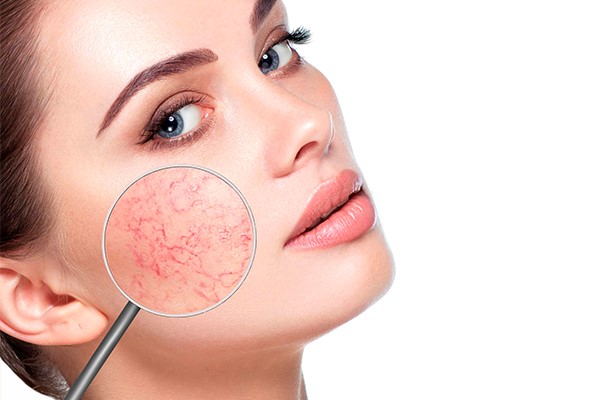Rosacea is a chronic inflammatory disease of the facial skin (rosacea, acne rosacea). Rosacea affects adults and is manifested by persistent facial flushing and the appearance of papules and pustules (acne on the face). Sometimes rosacea is mistakenly called demodicosis. The diagnosis of rozazea is made only on the basis of clinical data - a conversation with a doctor and examination of skin changes. There are no tests for rosacea. But in reality, not everything is so simple.
Rosacea treatment
Rosacea is a chronic inflammatory disease of the facial skin (rosacea, acne rosacea). Rosacea affects adults and is manifested by persistent facial flushing and the appearance of papules and pustules (acne on the face). Sometimes rosacea is mistakenly called demodicosis. The diagnosis of rozazea is made only on the basis of clinical data - a conversation with a doctor and examination of skin changes. There are no tests for rosacea. But in reality, not everything is so simple.
Rosacea symptoms
The manifestations of the disease depend on the stage of development of the disease.
Erythematous stage. Areas of hyperemia on the face (forehead, nose, cheeks), rarely on the chest, and telangiectasia appear and can persist for several days. Gradually, the number of flushing attacks and their duration increase. The hyperemia becomes brighter, sometimes acquires a bluish tint. Swelling and peeling appear. The patient feels a burning sensation in the places of localization of symptoms.
Papular (pustular) stage. In parallel with hyperemia, multiple grouped small papules or pustules with thin whitish scales appear. The main localization is the nose and nasolabial folds with subsequent spread to the chin and forehead. Symptoms persist for several weeks.
In difficult cases, swelling of the skin may appear, most often in the area between the eyebrows. The patient does not experience discomfort, with the exception of severe itching when the process extends to the scalp. A rash may appear on the chest or back.
Rosacea treatment
1. One of the important components of effective rosacea treatment is proper facial skin care and competent prevention.
2. Wash your face with warm water.
3. Eliminate prolonged exposure to the sun, use creams with an SPF filter of at least 30.
4. In cold weather, use greasy creams for protection.
5. Refuse baths and saunas.
6. Eliminate prolonged and intense physical activity.
7. Do not use creams with hormonal components, especially when treating steroid rosacea.
8. Cosmetic products should not contain vasodilating components, alcohols, heavy oils.
Diet is also important to ensure the success of therapy. It is recommended to exclude spicy, salty and smoked foods from the diet, do not consume alcohol, coffee and strong tea. It is recommended to introduce more vegetables and fruits, lactic acid products into the diet. It is important to eat food warm, not hot.
 Drug treatment of rosacea Drug therapy is prescribed taking into account the stage, duration and features of the course of the disease, the severity of symptoms. Antibiotic therapy is prescribed in the case of the infectious nature of the elements of the rash. For severe rosacea, broad-spectrum antibiotics are often prescribed.
Drug treatment of rosacea Drug therapy is prescribed taking into account the stage, duration and features of the course of the disease, the severity of symptoms. Antibiotic therapy is prescribed in the case of the infectious nature of the elements of the rash. For severe rosacea, broad-spectrum antibiotics are often prescribed.
To stop the inflammatory process, non-steroidal anti-inflammatory drugs are used, and in the absence of a result, glucocorticosteroids. Drugs that reduce the activity of the sebaceous glands and normalize the keratinization of the skin may be recommended.
Special creams and ointments for rosacea are prescribed for bacterial infections. They should have anti-inflammatory, antimicrobial, decongestant, drying and healing effects.
Antibacterial external agents often contain metronidazole and effectively deal with most pathogens of purulent processes, eliminating pustules.
Non-drug treatment:
1.laser therapy,
2. IPL therapy (treatment with high-intensity flashes of light),
3.microcurrent therapy,
4. cryotherapy.
Laser therapy
The principle of action of laser therapy (phototherapy) is the effect of a laser beam on the dilated vessels, as a result, their coagulation occurs and the symptoms go away. Several sessions are required to achieve a lasting result.
Laser therapy is often part of a comprehensive rosacea treatment plan. The action of the laser has an antiseptic and antibacterial effect, which is necessary in the treatment of papulopustular forms of the disease. Laser therapy helps to achieve a more stable and long-term remission.
Cryotherapy is also one of the effective treatments for rosacea. It helps to eliminate inflammation and discomfort, restore microcirculation and metabolic processes in the skin.
In our clinic you can get the following services: Dermatology | Laser Surgery | Laser | Laser Vaginoplasty | Cosmetology and good consultation




